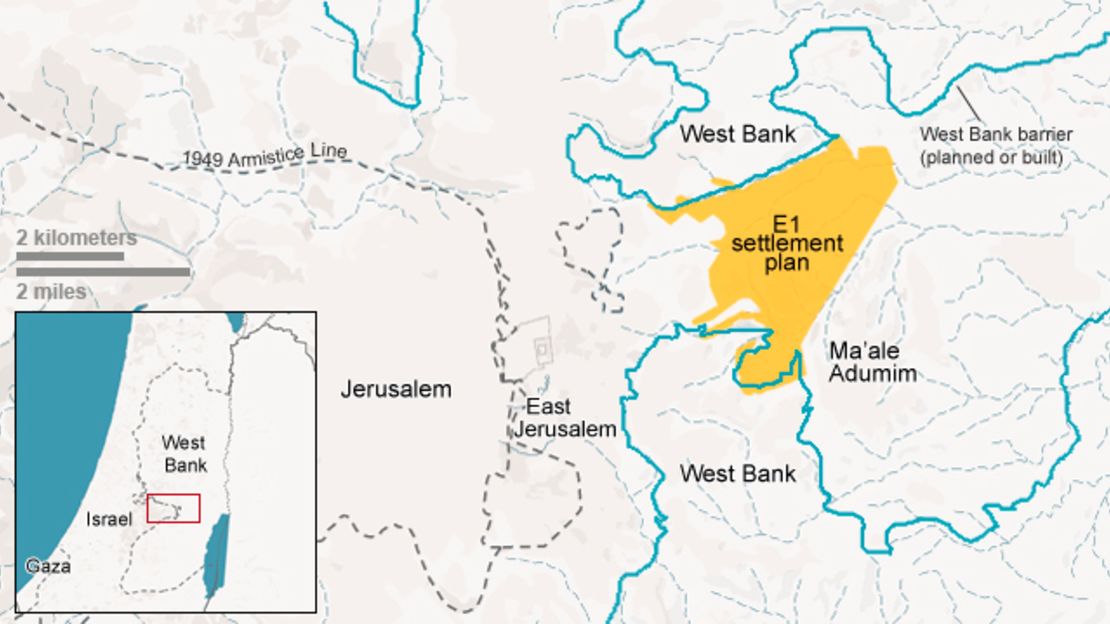Story highlights
NEW: Egypt summons Israeli ambassador over building plans
"A clear message must be sent to Israel," the Palestinian leader says in U.N. letter
Israel is under pressure to reverse its decision to expand West Bank settlements
Israel says it won't back down from the decision
Israel said Tuesday it won’t bow to demands by world leaders to abandon plans for new settlements on Palestinian territory.
“Israel will continue to stand by its essential interests even in the face of international pressure, and there will be no change in the decision that was taken,” the Israeli prime minister’s office said Tuesday.
The decision, which a senior Israeli official in the prime minister’s office said was in response to last week’s United Nations’ vote elevating the U.N. status of the Palestinian Authority, has drawn international ire and concern that it could complicate efforts to restart peace talks.
Israel plans to build 3,000 housing units in East Jerusalem and the West Bank, many of them in the large West Bank settlement of Ma’ale Adumim. Long-term plans call for the eventual construction of 5,000 units in the area.

Palestinian leaders object, saying the settlements are illegal and would slice the West Bank in two and cut it off from the proposed Palestinian capitol of East Jerusalem.
Israel has not yet formally acknowledged the plans.
Read more: Clinton: New Israeli settlements a ‘set back’ for peace
Australia and Egypt on Tuesday joined five European countries that have summoned Israel’s ambassador to hear criticism of the decision.
Australian diplomats expressed “grave concern” over the plan, the Foreign Ministry said in a statement.
Foreign Minister Bob Carr, traveling in New Guinea, said the decision would make peace negotiations more difficult.
“I am extremely disappointed with these reported Israeli decisions,” he said.
Egyptian Foreign Minister Mohamed Kamel Amr told Israeli Ambassador Yaakov Amitai that his government’s decision “does not comply with the principle of land versus peace that is the basis of the peace negotiations in the region,” the Foreign Ministry said.
Britain, Denmark, France, Spain and Sweden have also summoned Israeli ambassadors for similar discussions, which are frequently used to publicly demonstrate a nation’s displeasure with another country’s actions.
The British Foreign Office called Israel’s move “deplorable” and said it threatens a two-state solution to the Israeli-Palestinian conflict. The foreign ministries of France, Spain and Denmark issued similar statements asking Israeli officials to reverse their decision.
British Minister for the Middle East Alistair Burt said he met with Israeli Ambassador Daniel Taub on Monday, calling for Israel to heed calls “to avoid reacting to the U.N. General Assembly resolution in a way that undermines the Palestinian Authority or a return to talks.”
Read more: Abbas calls for Palestinian unity after ‘birth certificate’ for Palestinian state
The Palestinian Authority also blasted Israel’s decision Tuesday as a provocation that flies in the face of international will.
“A clear message must be sent to Israel that all of its illegal policies must be ceased or that it will be held accountable and will have to bear the consequences of its violations and obstruction of peace efforts,” Palestinian Authority President Mahmoud Abbas wrote in a letter to U.N. Secretary-General Ban Ki-moon.
The United States has said it is opposed to Israel’s decision, but has not taken the step of summoning its ambassador to say so.
“We urge Israeli leaders to reconsider these unilateral decisions and exercise restraint, as these actions are counterproductive and make it harder to resume direct negotiations to achieve a two-state solution,” White House spokesman Jay Carney said Monday.
Read more: Israel plans new homes in East Jerusalem, West Bank
The Israeli Cabinet, in a unanimous vote Sunday, rejected the U.N. General Assembly’s decision on Palestinian status, saying it changes nothing and will not be a basis for negotiations.
In an e-mail statement to reporters Tuesday, the prime minister’s office said that the U.N. decision was a “one-sided move” and said “Israel is not sitting with her hands tied.”
Also on Tuesday, Israel demolished a mosque in the village of Farqqa in the Hebron region of the West Bank and attempted to tear down the East Jerusalem home of a Palestinian family.
The mosque, which was previously torn down in 2011 because it lacked proper permits, was demolished again Tuesday as the result of a court case brought by Regavim, a pro-settler organization.
The group said the mosque had been built illegally and was blocking construction in the Jewish settlement of Abigail.
The building was not a mosque but “a building that was used for prayer” and was demolished according to a court order, said Guy Inbar, a spokesman for the Coordinator of Government Activities in the Territories which is part of the Israeli Defense Ministry.
“The case has no connection to the political developments and should not be connected to them in any way,” he said. “It was a court decision.”
Village council head Suliman Addra deplored Israel’s action.
“My message to the free world is to stop the Israelis from committing crimes against religious sites and to help in rebuilding the mosque,” Addra said.
In the East Jerusalem incident, municipal workers and Israeli border police began work to demolish the home, saying it lacks proper permits, before the homeowner was able to get a court order stopping the work.
“They destroyed all the internal furniture and electronics of the house and attacked my wife and handcuffed me, and held my children. It was done in a vicious way,” homeowner Tareq Ghaith said.
Read more: Palestinian bid explained
CNN’s Mike Schwartz, Kareem Khadder and Alexander Fenton and journalist Mohamed Fahmy contributed to this report.




